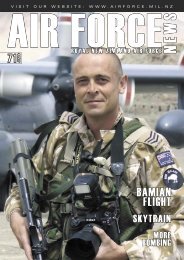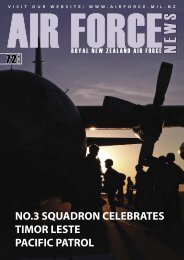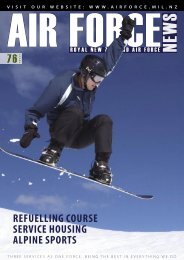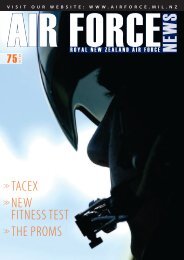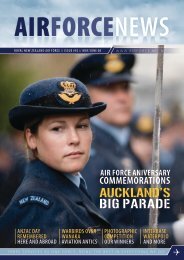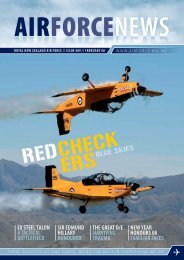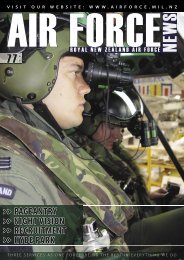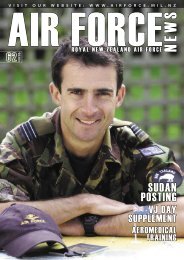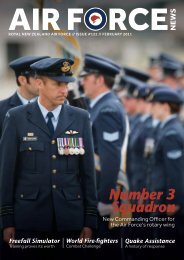BOMBING WEEK - Royal New Zealand Air Force
BOMBING WEEK - Royal New Zealand Air Force
BOMBING WEEK - Royal New Zealand Air Force
Create successful ePaper yourself
Turn your PDF publications into a flip-book with our unique Google optimized e-Paper software.
WN 06-0088-02<br />
WN 06-0088-01<br />
FLTLT Jennifer Atkinson raises a<br />
point in the syndicate discussion.<br />
FLTLTs Nick Cree, Michael Kilham, and Dicko Beaton:<br />
FLTLT Mike Kilham has since withdrawn from the<br />
course and resigned from the RNZAF.<br />
of competing for rankings, the emphasis is on students helping each other,<br />
contributing to discussion, and extending themselves. Despite that, it<br />
is no push-over. At times the workload can be demanding and includes<br />
essay writing, research, debating, and syndicate discussions on subjects<br />
as diverse as leadership development, contemporary military operations,<br />
media trends, project management, and international relations. The<br />
College also relies on external subject matter experts, often from Massey<br />
University. In the middle of the course, the student group goes on an<br />
overseas study tour (in 2005 to Vietnam, see report Pg 16, October 2005<br />
<strong>Air</strong> <strong>Force</strong> <strong>New</strong>s). In 2006 it is going to <strong>New</strong> Caledonia and China.<br />
So, just how successful is the course? We asked some former students.<br />
SQNLDR Peter Sutherland, who did the staff course last year, says the<br />
course is tough and is ‘quite a burden when you are doing it. But it is the<br />
sort of course where the benefi ts aren’t immediately obvious. For some it<br />
may take years or up to a decade before the skills learnt are put to use.<br />
In my case my job in the Directorate of Logistics Capability was enhanced<br />
by the exposure the course gave me to HQNZDF and a wide-ranging<br />
understanding of how the NZDF, MoD and the single Services relate to<br />
each other. Understanding those relationships is a key part of my job,<br />
particularly with regard to the proposed NH90 purchase.’<br />
SQNLDR Charlie Morris, an Engineer with Systems Development Unit<br />
tasked with making design modifi cations for RNZAF aircraft, agrees the<br />
course was ‘busy’ but says the opportunity to ‘delve deeply into bigger<br />
www.airforce.mil.nz<br />
AFN69, APRIL 06<br />
A STIMULATING COURSE<br />
GRANT CARR<br />
Seventeen <strong>Air</strong> <strong>Force</strong> FLTLTs, two A/SQNLDRs and a CAPT from the<br />
Phillipines <strong>Air</strong> <strong>Force</strong> are on the roll for the No.70 Junior Staff Course<br />
(JSC) at the NZDF’s Command and Staff College from 6 February to<br />
24 March 2006.<br />
The live-in course is a compulsory element for <strong>Air</strong> <strong>Force</strong> FLTLTs in line<br />
for promotion to SQNLDR rank.<br />
The JSC is described as an enjoyable time away from work and offers a<br />
unique opportunity to mix with a FLTLT peer group and consider aspects of<br />
the military beyond the day-to-day routine. It is a demanding programme<br />
where the saying ‘you get out of it what you put in’ holds true. Despite<br />
the demands of essays and presentations the course is both mentally<br />
and socially stimulating and professionally rewarding.<br />
At the time of my brief attendance the students were half way through<br />
their second week of the course. During the fi rst week the students are<br />
joined by personnel from the RNZN and NZ Army for the NZ Introduction<br />
to Joint Warfare Course.<br />
In the second week it was very much down to business. ‘The workload<br />
has really started to come on this week,’ says Auckland Engineer FLTLT<br />
Alex Cox. ‘It involves a lot of reading and research and I’ve been up till<br />
midnight twice this week working on essays. There’s an extensive library<br />
at the college and we also extensively use the Internet for research.’<br />
Despite the workload he’s pleased to be on the course and found the<br />
hardest part initially is just getting away from work. ‘Work commitment<br />
have a habit of following you,’ he says.<br />
The course splits into two syndicate groups for discussions and I’m<br />
treated to a discussion/debate by one on the concept of pre-emption<br />
– launching an attack on a nation that is perceived as offering an<br />
imminent threat to your security. The United States adopted this as a<br />
policy in 2002. It was a lively and apposite discussion where the level<br />
of participation by all course members indicated to me that debating an<br />
issue is an important and stimulating part of the course. Fascinating.<br />
picture issues and to meet and discuss these with regional colleagues<br />
on the course was a welcome change from the day-to-day routine of<br />
engineering work.’ And he has started bringing the wider political and<br />
social context into informal discussions with his troops. He is about to be<br />
seconded to project work with MoD and believes the knowledge he has<br />
of how the <strong>Air</strong> <strong>Force</strong> and MoD work together and the relationship with<br />
single Services will be most helpful.<br />
WGCDR Logan Cudby who did the course in 2003 before his posting<br />
to Afghanistan working for UNAMA says the course was ‘essential to<br />
making a critical contribution at the strategic level of international and<br />
inter-agency nation building. It’s a bit like a higher tertiary qualifi cation<br />
because it gives you the language and tools to work with people who<br />
have similar training.’<br />
The College’s modern, comfortable environment provides excellent<br />
facilities for study and group discussion. Live-in accommodation includes a<br />
separate study room for each course member and they have ample access<br />
to recreational facilities.<br />
They are provided with their own laptop and tablet PC which is linked<br />
wirelessly to the CSC’s internal network and the internet. By the end of<br />
their course, students have also developed a strong and supportive bond<br />
of friendship that remains throughout their career. CSC’s aspiration to be<br />
the premier Staff College is moving ahead in 2006 with their intention to<br />
develop a website on par with peer Staff Colleges around the world.<br />
17



![February 2007, Issue 78 [pdf 3mb, 44 pages] - Royal New Zealand ...](https://img.yumpu.com/17485296/1/184x260/february-2007-issue-78-pdf-3mb-44-pages-royal-new-zealand-.jpg?quality=85)
